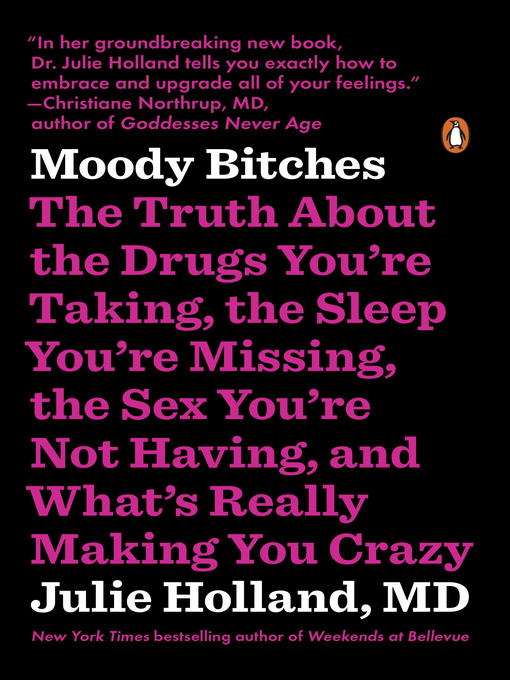
Moody Bitches
The Truth About the Drugs You're Taking, The Sleep You're Missing, The Sex You're Not Having, and What's Really Making You Crazy
کتاب های مرتبط
- اطلاعات
- نقد و بررسی
- دیدگاه کاربران
نقد و بررسی

April 27, 2015
Campbell’s fluid narration drives home the points made in this exploration of some women’s mood swings and the science behind drugs used to treat them. Campbell’s matter-of-fact tone and precise enunciation moves the listener easily through the research, which reveals how drug companies, powered by huge marketing campaigns, have turned normal human experiences, such as anxiety and stress, into diseases that they claim need to be fixed through medication. While well-timed pauses and modulations highlight the surprising statistics offered—such as that antipsychotic drugs are the #1-selling medication in the “Altered States of America”—Campbell’s soothing voice also serves Holland’s argument that fluctuations in a woman’s mood are not only normal but necessary. Even the usually negative connotations of bitch become positive and powerful when Campbell utters the word with a crispness and attitude, helping to accentuate the author’s spin on women’s sexuality. A Simon & Schuster paperback.

January 1, 2015
Beyond the provocative title, psychiatrist Holland (Weekends at Bellevue: Nine Years on the Night Shift at the Psych ER, 2009) does not cast aspersions but instead urges women to embrace their mood fluctuations as part of natural hormonal rhythms.Medical history has not been kind to women's health. "[M]alaise, headaches, irritability, nervousness, insomnia, fatigue, low libido, high libido, water retention" are just some of the complaints by women that 19th-century male physicians characterized as hysteria. Even today, women who get angry or cry in the workplace risk being labeled as "emotional and irrational." Holland parses the science behind mood swings to explain the natural effects and functions of estrogen, progesterone, testosterone and other hormones. Sexual drive, marriage, fidelity, childbearing and bonding are all tied to hormonal activity. While the author explores a fascinating array of subjects, much of the delivery of the information is disorganized, resulting in overload and frequent shuffling of pages to review what hormone or neurotransmitter is responsible for what. Holland devotes about half the book to a potpourri of advice on achieving good mental and physical health. There's not much new information here, and the section could have used some pruning, but the tips are worth reviewing. A top stressor for women is trying to balance job and family, and stress causes inflammation, which makes you vulnerable to chronic diseases such as heart disease, asthma, Alzheimer's, diabetes and arthritis. Understanding what's going on in your body and mood swings reduces stress and promotes mental health, writes Holland. Limiting inflammation with a healthy diet-light on carbs and high on fresh vegetables-exercise, sleep, good sex and communing with nature promote physical health. A hodgepodge of science and personal observation, this all-encompassing book urges women to get in sync with their bodies and embrace their moods.
COPYRIGHT(2015) Kirkus Reviews, ALL RIGHTS RESERVED.

March 1, 2015
Moodiness is healthy. The biological basis for women's emotional lives shouldn't be tamped into submission; yet we should understand how our lifestyles contribute to hormonal imbalances and make choices that promote physical, mental, and emotional wellness. In a frank style--think good friend who's a doctor--Holland examines how prescription drugs work in relation to the stages of women's lives. This guidance is aligned with recommendations for healthy diet and exercise practices that naturally equalize the body's systems. Holland's perspective feels very modern. We are inundated with information about and recommendations for prescription drugs for every possible malady. Concurrently, many people are trying holistic health practices such as yoga and meditation. The author, who appears frequently on TV, evaluates the multitude of ways women can reconnect with their natural state of being. Now in private practice, Holland shared her early experiences working in a psychiatric emergency room (Weekends at Bellevue) and examined the effects and uses of drugs in The Pot Book and Ecstasy. The Bellevue memoir was made into a movie and a screen adaptation for her latest book is in development. VERDICT Recommended for general nonfiction audiences and especially for those interested in women's health. [See Prepub Alert, 9/29/14.]--Meagan Storey, Virginia Beach
Copyright 2015 Library Journal, LLC Used with permission.

























دیدگاه کاربران